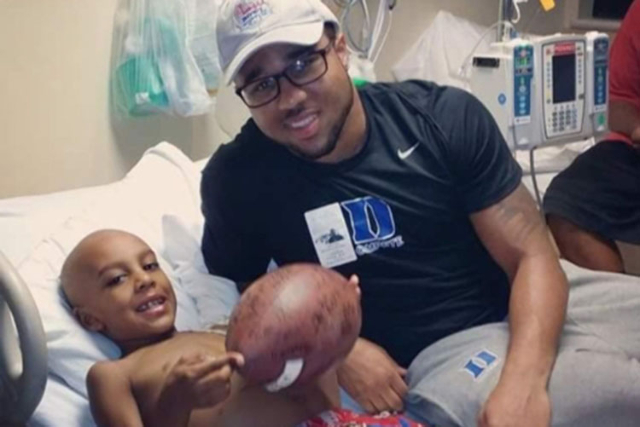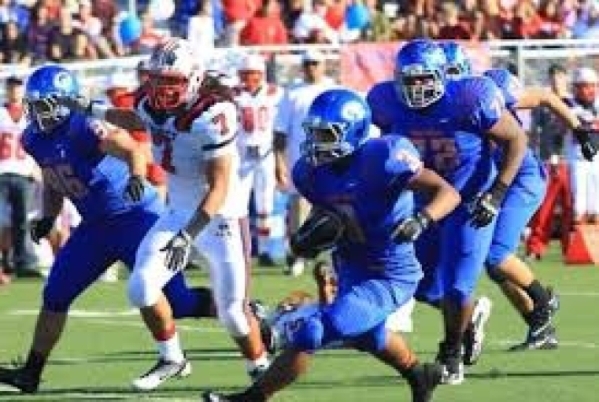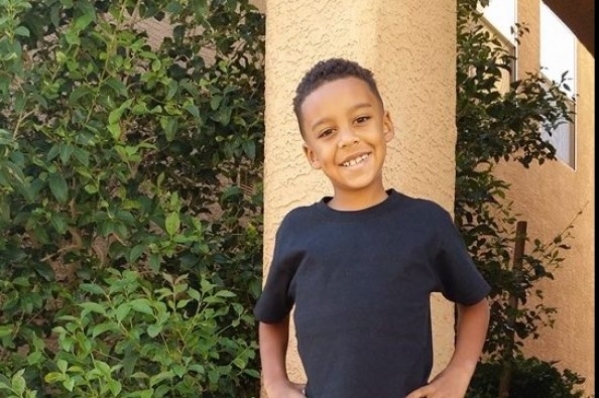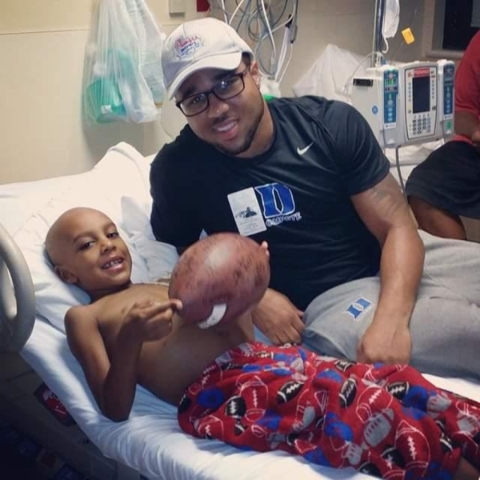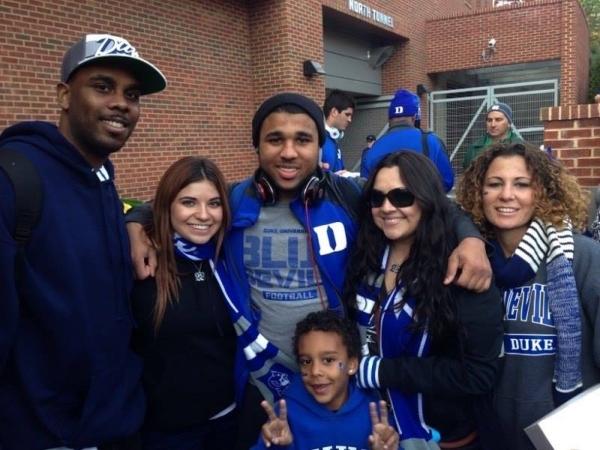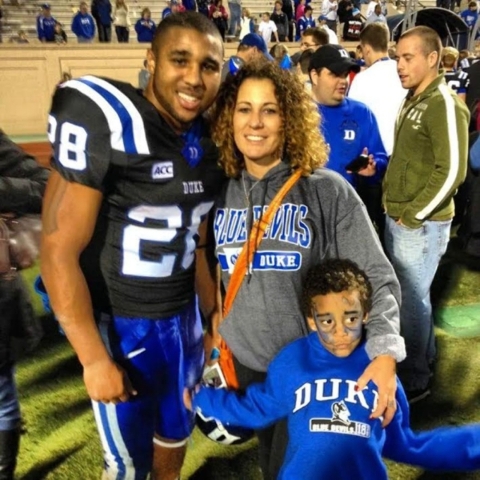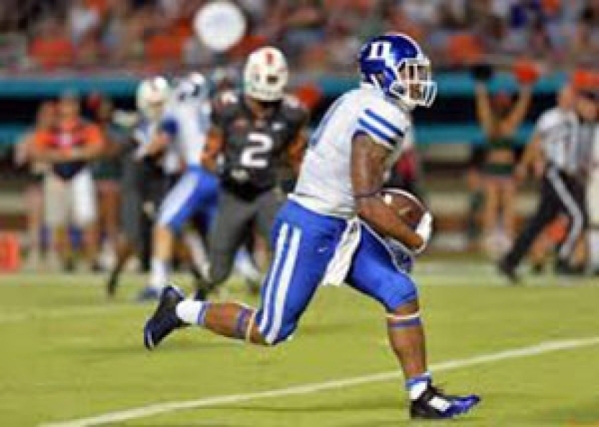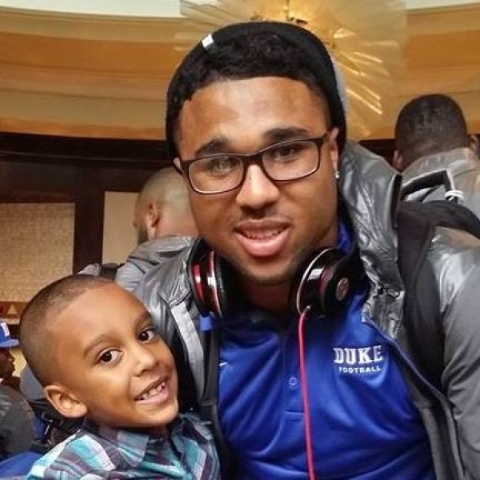Former Bishop Gorman rusher Powell carrying a heavy heart
The words flow from the sort of emotion only losing a child could create, one of sadness and heartache and despair. She likens the experience to a natural disaster, to an earthquake followed by a tsunami followed by the universe shifting in the most sorrowful and cruel way. She writes about walls crashing down and control being surrendered. She wonders how they will survive.
"The whole world feels unstable, unpredictable, unsafe, unsure ... fearfully bracing ourselves for another unpredictable jolt ..."
When he took his final breath at 4 a.m. on June 13, Malachi Briggs was 7 years old and no longer able to fight the cancer that had ravaged his body. He was at home in Las Vegas, in hospice care, his tumors inoperable and his loving spirit preparing to pass to a peaceful place without pain and catheters.
Skarlet Forwood was surrounded by family and friends as her little boy slipped away, and when his sister climbed the stairs to alert him Malachi was gone, Shaquille Powell faced the sort of reality that had, tragically, been expected.
When he carries the football for the first time as a Duke senior Thursday night against Tulane in New Orleans, as a Doak Walker Award candidate with 1,055 career rushing yards, Powell will do so with his mother cheering from the stands and his brother doing so within his heart.
It's true that a child's loss is not an event, but rather an indescribable journey of survival, one Powell is intent on helping his mother navigate for years to come.
When he asked Tony Sanchez about Powell during the recruiting process, this is what the then-Bishop Gorman High coach imparted to David Cutcliffe: If Duke's coach wanted a player who would make the Blue Devils better the day he stepped onto campus, a young man who worked harder in practice than anyone else Sanchez had coached, who was more competitive than anyone else, tougher than anyone else, he wouldn't find a better fit than Powell.
"It's a tragic thing what happened to the family, and I've been there myself," Cutcliffe said. "I lost a brother at 7 and my Daddy at a young age. I told Shaquille that you have to be built for something like this, mentored well. No one can pick him up and carry him right now. He has to be equipped. But even before this occurred, Shaquille Powell was tough and dependable. This is the hardest thing he has ever dealt with in a young life. He worried about Malachi all those months, and now he is worried about his mom. Worrying about mom will keep you up at night.
"But I knew the minute he returned to school, it was as if he had come home to his family, where he is welcomed and loved unconditionally."
Said Sanchez, now in his first season as UNLV's coach: "To this day, I've never had anyone who worked harder than Shaquille, a guy who had knee surgery and played 17 days later. He never looked for an out. Ever. I don't think anything helps you with this sort of loss. To think that (Malachi) isn't here anymore is devastating. It's never going to be OK, and it's never going to be easy. But they're strong, strong people, and they will find a way to manage this."
"A familiar voice whispers, reminding us that despite what our world looks like in this moment, with all the devastation we feel and destruction we see, our foundation is strong and we still have so much to be grateful for, to look forward to! I know that voice ... It's his voice ... Malachi!"
Forwood is writing a letter of thanks to hundreds of people, included among them the Bishop Gorman and Duke communities that so selflessly and devotedly stepped forward to help once word spread about Malachi's illness, diagnosed in September 2014 as kidney cancer. He also had tumors on his lungs. It wasn't a fair fight.
Powell made several trips to Las Vegas from Durham, N.C., several of those 4,500-mile round-trip flights, eventually balancing summer school and preparations for his senior season with his unending desire to be home, with his mother and siblings, with Malachi. His coaches and teammates and teachers at Duke were unceasing in their support, while those who coached and taught and cheered for him at Bishop Gorman looked after his mother and brother, many helping to raise almost $40,000 for medical expenses during a gap in the family's health insurance.
"(Malachi) loved football," said Shaquille, who was able to give his brother a signed game ball from a Homecoming win against Virginia last season. "Full of life, always positive, always ready to play, never a dull moment with him. He loved the Packers because they're always good. I tried to make him a Raiders fan, but that wasn't happening.
"It's hard. It's sad. It hurt that we really couldn't do anything except make him as comfortable as possible. When I saw him the last time, when I walked into the room, I had never seen him like that. ... Why him? Why was his life cut so short? He had everything in front of him. I think the routine of (college) might help, but he's always on my mind. You try to stay busy, but then it comes time to say my prayers and read those words we said at the service and look through all the pictures. It's really difficult."
He was the little boy who wouldn't stop running around the pool at Bishop Gorman team parties, the one who after a particular home game scared the you-know-what out of his mother when no one could find him well after the final play and families had gathered on the field to take pictures with their favorite Gaels.
That night, little Malachi, whose father is former UNLV defensive lineman Ahmad Briggs, wandered over to the visiting team's bus and climbed aboard. Someone eventually noticed him. The bus stopped and turned around.
He wasn't yet 4 years old.
He had no fear, never saw bad in others, absolutely loved the next adventure. And when he got sick, he learned more about medication than those administering it, often asking nurses what they were about to give him and whether it was the correct dosage.
"He was the smartest of us all, and he was only 7," said Forwood, now a social worker who previously worked nine years for Clark County Probation. "You couldn't contain him. He was always on the go.
"You know, one thing that really drew me to Duke for Shaquille was this core set of values I knew would continue to help him grow into the man I had raised as a single mother. Little did any one of us know how we would now be tested. But he's a strong young man, and we will get through this."
Malachi's grandparents arrived at midnight that evening in June, the last of family to reach the house, and were able to say goodbye.
Four hours later, he took his final breath.
Skarlet Forwood still awakes at 4 a.m.
Her eyes, for whatever reason, just seem to open at that time.
"The world keeps spinning ... nights turn into days, and days into nights. My head is spinning ... I look around at the rubble knowing we must rebuild, but not knowing exactly where to begin, not sure I have the strength to go on, not clear of the magnitude of destruction, still trying to make meaning of the devastation, of our loss ... still absent of the blueprint, still void of the architectural design ...
"My hope is for Malachi to never be forgotten ... For each person he has touched to always hear his voice, his whisper in the midst of fear, self doubt, obscurity, 'You can do it, never give up, keep going, one step at a time!'"
"To hear his laughter and imagine his playfulness when life gets you down ... a reminder that LOVE is the best medicine ... When life gets dull or monotonous, to hear him whisper, 'Be adventurous, the time is now, GO BOLDLY without fear or excuse ...
"Thank you, each of you, for everything ..."
Ed Graney can be reached at egraney@reviewjournal.com or 702-383-4618. He can be a heard on "Seat and Ed" on Fox Sports 1340 from 2 to 4 p.m. Monday through Friday. On Twitter: @edgraney.



